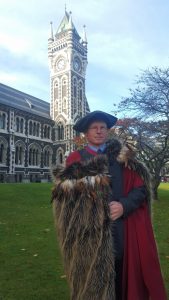
Dr James Robinson in front of the Otago University clock tower. James is wearing a korowai provided by the Heritage New Zealand staff as a mark of respect and appreciation for James’ academic achievement. Ngatiwai Kaumatua gave special consent for James to wear a korowai off-stage as part of graduation day, even though James does not claim an iwi connection to Ngatiwai or any other iwi. (Image sourced HNZ Media Release)
"Research into the prehistoric and early historic settlement by Maori of the Poor Knights Islands has earned a Northland archaeologist a PhD from Otago University.
Dr James Robinson – Heritage New Zealand’s Northland Regional Archaeologist – recently attended his graduation in Dunedin marking the end of a 12-year academic commitment."
“My thesis was a multi-disciplinary study of Maori settlement of Tawhiti Rahi, the larger of the Poor Knights Islands off Northland’s east coast and was mandated by the Ngatiwai Trust Board and kaumatua Pona Matenga,” he says.
“The data-rich research took a holistic approach encompassing both environmental science and archaeology as well as historic and traditional sources so as to determine the timing and nature of Maori settlement on Tawhiti Rahi.
"It also reflects a long-standing relationship with Ngatiwai who have supported the research and provided James with historical information, cultural guidance and backing throughout the life of his PhD commitment.
“The research that underpinned my thesis could not have been achieved without the help and support of a lot of people, but in particular I would like to acknowledge tohunga Te Warihi Hetaraka and Rangatira Hori Parata, for their assistance both in the field and with tikanga,” he says.
The Media Release is as follows:
June 21
MEDIA RELEASE
PhD for Northland archaeologist
Research into the prehistoric and early historic settlement by Maori of the Poor Knights Islands has earned a Northland archaeologist a PhD from Otago University.
Dr James Robinson – Heritage New Zealand’s Northland Regional Archaeologist – recently attended his graduation in Dunedin marking the end of a 12-year academic commitment.
“My thesis was a multi-disciplinary study of Maori settlement of Tawhiti Rahi, the larger of the Poor Knights Islands off Northland’s east coast and was mandated by the Ngatiwai Trust Board and kaumatua Pona Matenga,” he says.
“The data-rich research took a holistic approach encompassing both environmental science and archaeology as well as historic and traditional sources so as to determine the timing and nature of Maori settlement on Tawhiti Rahi.
“The research suggests that before European arrival, islands in New Zealand were used in different ways over the centuries, often shaped by what was happening in wider Maori society throughout that time.”
The particular geophysical limitations of Tawhiti Rahi meant that Maori were constrained in the ways they could use this island and, as a result, the archaeological features are more visible than those found in settlements on less constrained islands and the mainland.
“The Poor Knights always remained a part of the Ngatiwai tribal maritime territory, however, which included the mainland coast and offshore islands in a seaway sheltered by Aotea [Great Barrier],” he says.
Completion of his PhD cements a long-standing connection with Northland which began over 30 years ago when James first started working as an archaeologist and heritage specialist for the Department of Conservation in the Auckland and Northland regions.
It also reflects a long-standing relationship with Ngatiwai who have supported the research and provided James with historical information, cultural guidance and backing throughout the life of his PhD commitment.
“The research that underpinned my thesis could not have been achieved without the help and support of a lot of people, but in particular I would like to acknowledge tohunga Te Warihi Hetaraka and Rangatira Hori Parata, for their assistance both in the field and with tikanga,” he says.
“I am very grateful for their encouragement and help over the years.”
While completing his PhD James undertook work as a contract archaeologist in Papua New Guinea, and most recently in Australia. He ‘came home’ to Northland late last year to take up the position of Northland Regional Archaeologist for Heritage New Zealand.
“I love Northland and its extraordinary history which has played such an important part of my life over the years,” he says.
“It is a great privilege to be able to live and work in this part of the world again.”












Comments are closed.